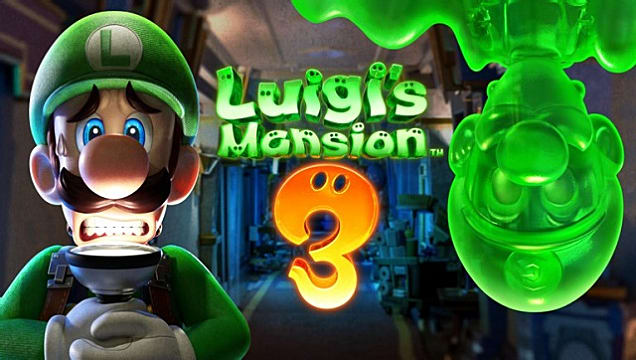

Vacations just never seem to work out well for the Mario bros. Whether it's the kidnapping on Isle Delfino, the mad witch of the Beanbean Kingdom, or peculiar happenings in Rogueport, what starts out as a peaceful getaway always turns into just more world-saving work.
If you've seen the Luigi's Mansion 3 trailers, you already have a general idea of what goes down in the game. Mario and co. get an invitation to the swanky Last Resort Hotel, and in true horror film fashion, they completely ignore all the obvious warning signs that this is a bad idea and settle in for a relaxing, luxurious vacation.
Of course, it all goes terribly wrong, Mario, Peach, and the Toads get turned into paintings courtesy of King Boo, and poor Luigi is left running for his life, ending up in a laundry chute. His old friend Professor E.Gadd just so happens to be staying at the hotel too (how lucky is that, right?). His car in the basement garage just so happens to contain a new model of the famous Poltergust.
The sub-series' characteristic humor and inability to take anything seriously make for a fun story even if it is familiar, and there's one other new addition that ultimately transforms everything else in the game: Helen Gravely. The hotel setting is reliant on including her as a secondary villain, and the hotel is what makes Luigi's Mansion 3 really shine.
The first two games were variants of "Collect All Things to Destroy Big Bad," especially Dark Moon, which had you collect Dark Moon pieces and Boos. Even though LM3 has defeating Helen and King Boo as its ultimate goal, and you do collect elevator buttons, the buttons are just a means to keep exploring the hotel.
And there's a lot of exploring to do. The Last Resort has 17 floors total, many of which you'll revisit again and again, either to explore some nook you forgot or to gather up some of the 100+ Gems you can collect (so many, we actually had to split our Gem guides into a part one and part two).
Luigi's Mansion 3 does away with Dark Moon's iffy mission structure, meaning you're free to explore to your heart's content. Ghosts reappear from time to time on cleared floors too, so it never feels like you're backtracking through empty areas. It feels like a living (dead) hotel.
That, the hotel's sheer size, and the presence of a vaguely important end goal off in the distance give Luigi's Mansion 3 a strong sandbox feel, not unlike Breath of the Wild, even if it's obviously linear in nature.
A big part of the sandbox element here is in how Luigi interacts with the hotel. Turn the sink faucets on, mess with the burners in the kitchen, destroy the dining room — whatever you want. Most of this involves just pressing the action button to interact with something or using the suck or expel functions on the Poltergust. But the real star in Luigi's toolbox is the plunger shot.
Luigi can fire off a plunger at a good many objects around the Last Resort and for various reasons — sometimes to uncover a hidden item, sometimes just to get something out of the way, and sometimes just because that fancy vase sitting in the corner really would look better in a hundred pieces.
The actions and physics are sort of like Elebits, only they actually stay fresh for more than five minutes.
I played with toilets a lot in Luigi's Mansion 3 — and it was worth it.
The vast majority of actions you take in Luigi's Mansion 3 reward you in some form or another. Eight times out of 10, you get showers of coins, bills (money, not duck), pearls, and gold bars for your efforts, while other times you'll uncover one of a floor's six hidden Gems.
Still, others are just fun, often quirky responses to Luigi's actions. For example, the toilet in the bathroom adjoining Mario's room spits out a sword when Luigi checks it out. For absolutely no reason. As far as I can tell, it's the only toilet in the game that does this too, and it's not alone in the one-off, bizarre interactions department (or the quirky toilet department either).
What this does is clever, because it teaches you to pay attention to everything in a room, even the most mundane or innocent-looking things. It compels you to see what you can do with them. A good many puzzles in Luigi's Mansion 3 — especially the Gem-related ones — require that same level of attention to the environment and interacting with seemingly obscure objects, making this a fun and intuitive way to help players along without holding their hands.
There is a bit of a bump in the road here, though. For all the things you can do and the many rooms you can explore, the payoff is limited to money and Gems. One thing that worked well in Dark Moon was the need to upgrade your tools using the cash you found, adding an extra sense of urgency and practicality to gathering up all the lovely shinies.
Luigi's Mansion 3 does away with upgrades; your Dark Light never overheats, and Gooigi's existence means you don't need enhancements for the Polgergust and plunger shot. Here, you're back to only seeing your efforts pay off at the end with a ranking system and hotel of your own based on how much cash you earned throughout the game.
It works in the original Luigi's Mansion because there's just not as much to explore, and it's a short game. But there are times in Luigi's Mansion 3 where one wishes there was maybe something else on offer or some other incentive to explore every nook and cranny.
However, this feeling is typically short-lived thanks to the nature of the hotel and the game's slick pacing. No floor outstays its welcome, and each one boasts layouts of different sizes and structures, so it never gets boring. The RIP Suites, for example, are your standard hotel rooms, but then the Shops floor is much more compact and built around basically destroying everything you see. The fourth floor is pretty much just a boss fight with some small rooms sprinkled around for exploration.
And I'd be remiss to not mention how fantastic every floor looks. The attention to detail in Luigi's Mansion 3 is staggering, and it's easily one of the better, if not the best, looking games on the Switch.
This is helped along by some excellent level design in general. Every setting is bursting with personality in some form or another. Whether it's the theme park nature of Castle MacFrights (where a tinny theme-park style track plays when you arrive in front of the castle, and drink cups and popcorn bags scattered around everywhere) or the claustrophobicic and eerie Tomb Suits (complete with sparkling sand and too-small-for-comfort rooms), the design is truly high quality.
Even the floors with a lot to do and see go by quickly, and the game's combat plays an important role in their speed. Luigi's Mansion 3 is packed with ghosts, lots of ghosts of different shades and abilities, and lots of boss ghosts as well. However, the Slam feature significantly cuts down the time it takes to absorb them into the Poltergust.
Most regular ghost battles are, admittedly, a bit on the easy side. That's not necessarily because of the Slam mechanic, though. You'll get ganged up on by hordes of ghosts on occasion, but in many cases, it's sort of like a musou game; they just wait for you to attack them. There are still times when you'll be kept on your toes and need to make use of those Gold Bones that revive you though, so it's a bit of an odd balance.
Granted, Luigi's Mansion has never been difficult, and it just isn't meant to be that kind of game. And the benefit to pacing can't be denied either, especially when it helps make boss battles seem faster. Bosses in the previous two games weren't always challenging in the truest sense of the word, but they were tedious. Luigi's Mansion 3 goes a long way in fixing that issue and making them fun.
Another factor in that is how varied each boss and their fight is as well; every boss has a stand-out design and requires wildly different methods to defeat, so even when it's easy, it's never dull.
The controls deserve a brief mention as well. For some, it's been a bit of a sore area, because the primary way you're taught to activate the Dark Light or plunger shot doesn't lend itself to rotating Luigi with the right stick. You can use the shoulder buttons for these though ("L" for the plunger and "L+R" for the Dark Light), which makes it a non-issue. Even still, annoying as the defaults were at first, it never really hampered my progress or enjoyment.
Pros:
- Excellent level design
- Pitch-perfect pacing
- Full of quirky humor
- Fun boss designs and boss battles
- So much to explore and interact with
- Looks and sounds amazing
Cons:
- Could have benefited from more immediate rewards or need for collecting all that money
- Regular combat can be a bit too easy (even if it's still fun)
- Controls might be annoying for some
Luigi's Mansion 3 is just pure fun to play. There is always something to do, something new to see, or some puzzle to solve. Even if the rewards aren't always quite as rewarding as they could be, the cleverness of the design and fast pacing don't let the stale feeling linger for very long.
Luigi's Mansion 3 one of the best games on the Switch right now.
[Note: A copy of Luigi's Mansion 3 was provided by Nintendo for the purpose of this review.]
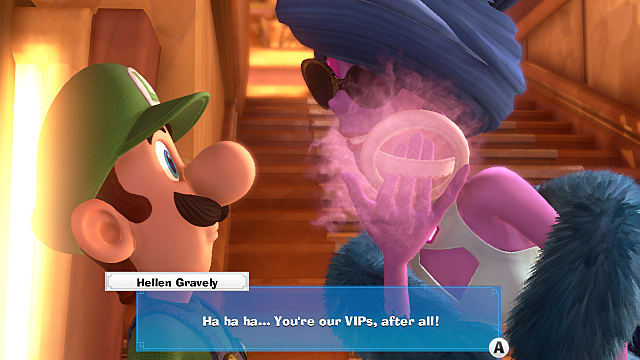
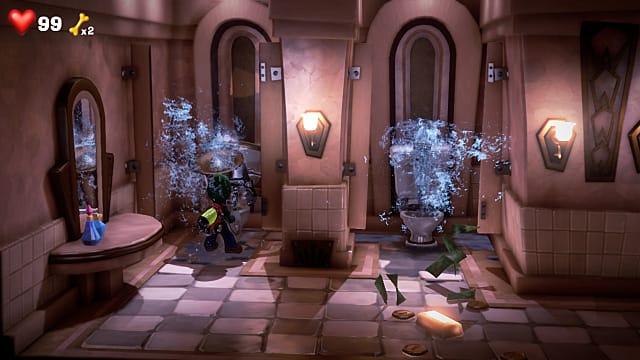
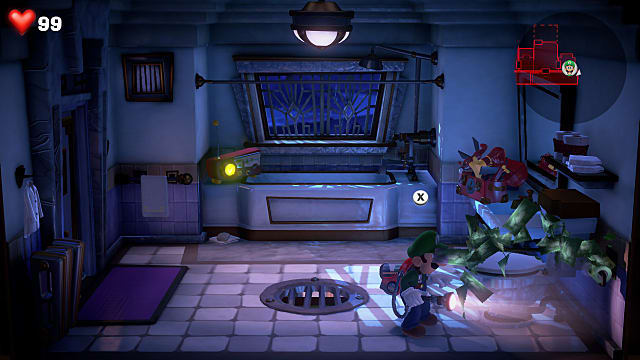
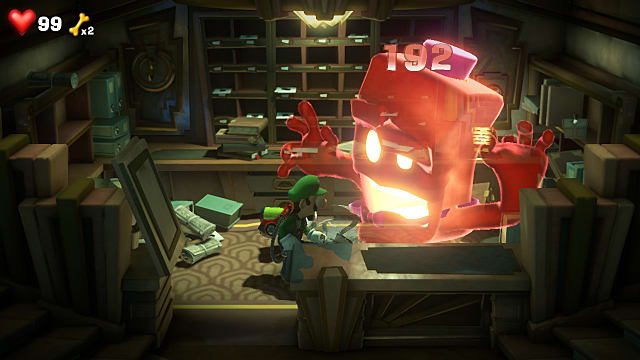
0 comments:
Post a Comment